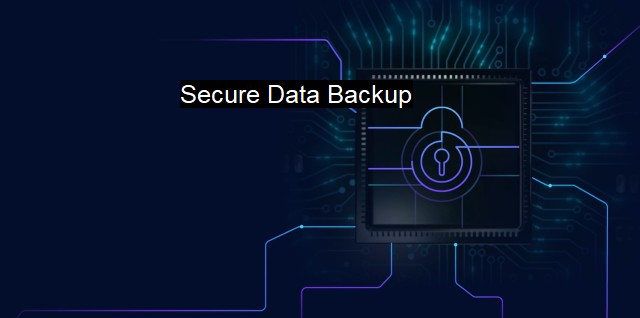What is Secure Data Backup?
The Importance of Secure Data Backup: Mitigating Cybersecurity Threats and Protecting Sensitive Business Data
Secure Data Backup is a fundamental aspect of any cybersecurity strategy. It is essentially the process of copying and archiving files and data, with the aim to use these backup copies to restore original content in case of data loss events such as system failures, accidental deletion, theft, or malware attacks. Ensuring data security through reliable and robust backup protocols notably lessens the risk for corporations, individuals, or organizations of experiencing severe downtime or, at worst case scenario, going out of business due to catastrophic data loss.Secure data backups become vital guards. With the digital universe growing exponentially, cyberattacks become increasingly intricate and ordinary. Conventional data security solutions email protection, malware, and virus scans are no longer sufficient. These attacks can be detrimental, and safeguard measures can often fall short of addressing them, and thus, secure backup solutions can function as potent, supplementary security layers.
Antivirus programs form an essential part of every secure data backup strategy. These applications scan, detect, and eliminate viruses and different other malicious programs that compromise data integrity. As virtual threats continue to evolve, having an appropriate, powerful antivirus serves as the first line of defense against data corruption.
Today's backups are tailored to answer the question of security from the ground up. Considering that cyber-attacks are not always explicit and may take place over a prolonged period before detection, backups have the ability to store earlier versions of files. This allows restoration to a safe point before an attack happened, therefore effectively undermining the attack's impacts entirely.
Secure data backups are not just a matter of copying data. They are a carefully designed mixture of technologies that maintain the integrity and confidentiality of the copied data. Procedures like data encryption and password protection play a significant role in this. Also, it is crucial to store backups securely. This could encompass multiple locations, both on-site and off-site, to secure against physical disasters such as fires or floods, and also ensuring that copies in cloud-based storage are adequately protected against hacking.
Maintaining the confidentiality, integrity, and availability of data is known as the CIA Triad perhaps the most fundamental concept in this field. Secure data backup ties directly into each aspect of the triad. It maintains confidentiality by preventing the unauthorized access or disclosure of data, integrity by securing that data is accurate and unchanged, and availability by ensuring data can be accessed when necessary, especially in the face of attacks or accidental deletion.
Secure data backup is a vital recovery tool. But it also forms the last line of defense in cybersecurity. It provides a critical safety web, ensuring data survived amid destructive cyber-attacks. In an age of evolving digital threats, maintaining high-grade backup protocols is essential.
Yet, while backups will keep your data safe, they cannot prevent attacks. Thus, secure data backups should be part of a holistic cybersecurity strategy involving firewalls, antivirus software, user training, and proactive threat hunting. Just as how one would ideally put various measures in place to prevent a burglary, similarly, it is important to utilize a extensive range of approaches in protecting data.
Secure data backup in the realm of cybersecurity is about much more than just preserving data. It is about dovetailing this process seamlessly into broader security procedures at every stage. By tightly integrating the backup process with antivirus and other protective measures, companies and individuals can ensure that their valuable data has the highest level of protection, positioning secure data backup as a must-have in today's digital age.

Secure Data Backup FAQs
What is secure data backup?
Secure data backup is the process of creating multiple copies of digital data and storing them in a secure location to prevent data loss or corruption in the event of a cybersecurity incident or system failure.What are some best practices for secure data backup?
Some best practices for secure data backup include regularly backing up data on multiple devices, using encryption to protect data during transfer and storage, storing backups in a physically secure location, and testing backups regularly to ensure their usability.What are some common data backup solutions?
Some common data backup solutions include on-site backups, cloud backups, and hybrid backups that combine both on-site and cloud storage. It's important to choose a backup solution that meets your organization's unique needs and provides sufficient protection against potential data breaches.How can antivirus software help with secure data backup?
Antivirus software can help prevent cyber attacks that could compromise data backups by identifying and blocking malware and other malicious threats. Additionally, antivirus software can help identify vulnerabilities in backup systems and recommend patches or updates to improve their security.| | A | | | B | | | C | | | D | | | E | | | F | | | G | | | H | | | I | | | J | | | K | | | L | | | M | |
| | N | | | O | | | P | | | Q | | | R | | | S | | | T | | | U | | | V | | | W | | | X | | | Y | | | Z | |
| | 1 | | | 2 | | | 3 | | | 4 | | | 7 | | | 8 | | |||||||